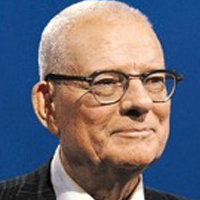W. Edwards Deming
William Edwards Deming was an American engineer, statistician, professor, author, lecturer, and management consultant. William Edwards Deming (1900-1993) is widely acknowledged as the leading management thinker in the field of quality. He was a statistician and business consultant whose methods helped hasten Japan’s recovery after the Second World War and beyond. He derived the first philosophy and method that allowed individuals and organisations to plan and continually improve themselves, their relationships, processes, products and services. His philosophy is one of cooperation and continual improvement; it avoids blame and redefines mistakes as opportunities for improvement. Deming’s work and writing constitute not so much a technique, as a philosophy of management, Total Quality Management, that focuses on quality and continuous improvement but which has had – justifiably – a much wider influence. W. Edwards Deming, in full William Edwards Deming, an American statistician, educator, and consultant whose advocacy of quality-control methods in industrial production aided Japan’s economic recovery after World War II and spurred the subsequent global success of many Japanese firms in the late 20th century.
The son of a small-town lawyer, Deming attended the University of Wyoming (B.S., 1921), University of Colorado (M.S., 1924), and Yale University (Ph.D. in mathematical physics, 1928). He then taught physics at several universities, worked as a mathematical physicist at the United States Department of Agriculture (1927–39), and was a statistical adviser for the U.S. Census Bureau (1939–45). From 1946 to 1993 he was a business consultant and a professor of statistics at New York University’s graduate school of business administration. He was also appointed a distinguished professor in management at Columbia University in 1986.
In the 1930s Deming became interested in ways that statistical analysis could achieve better quality control in industry. Deming’s quality-control methods were based on a systematic tallying of product defects that included the identification and analysis of their causes. Once the causes of defects were corrected, the outcomes were tracked to measure the effects of those corrections on subsequent product quality.
In 1950 Japanese business leaders invited Deming to Japan to teach executives and engineers about the new methods. Japanese companies quickly adopted his methods, with the result being a commitment to quality control that helped Japanese firms dominate some product markets in many parts of the world. The Deming Prize (established 1951), awarded annually to Japanese corporations that win a rigorous quality-control competition, is named in Deming’s honour. It was not until the 1980s that Deming’s ideas were adopted by American corporations seeking to compete more effectively in the world market.

W. Edwards Deming
Date of Birth: 14 Oct 1900
Birth Place: Sioux City, Iowa, United States
Proffession: American engineer
Nationality: United states
Death: 20 December 1993, Washington, D.C., United States


